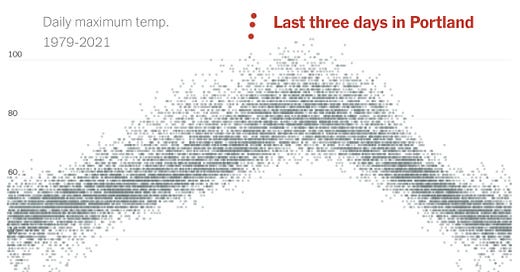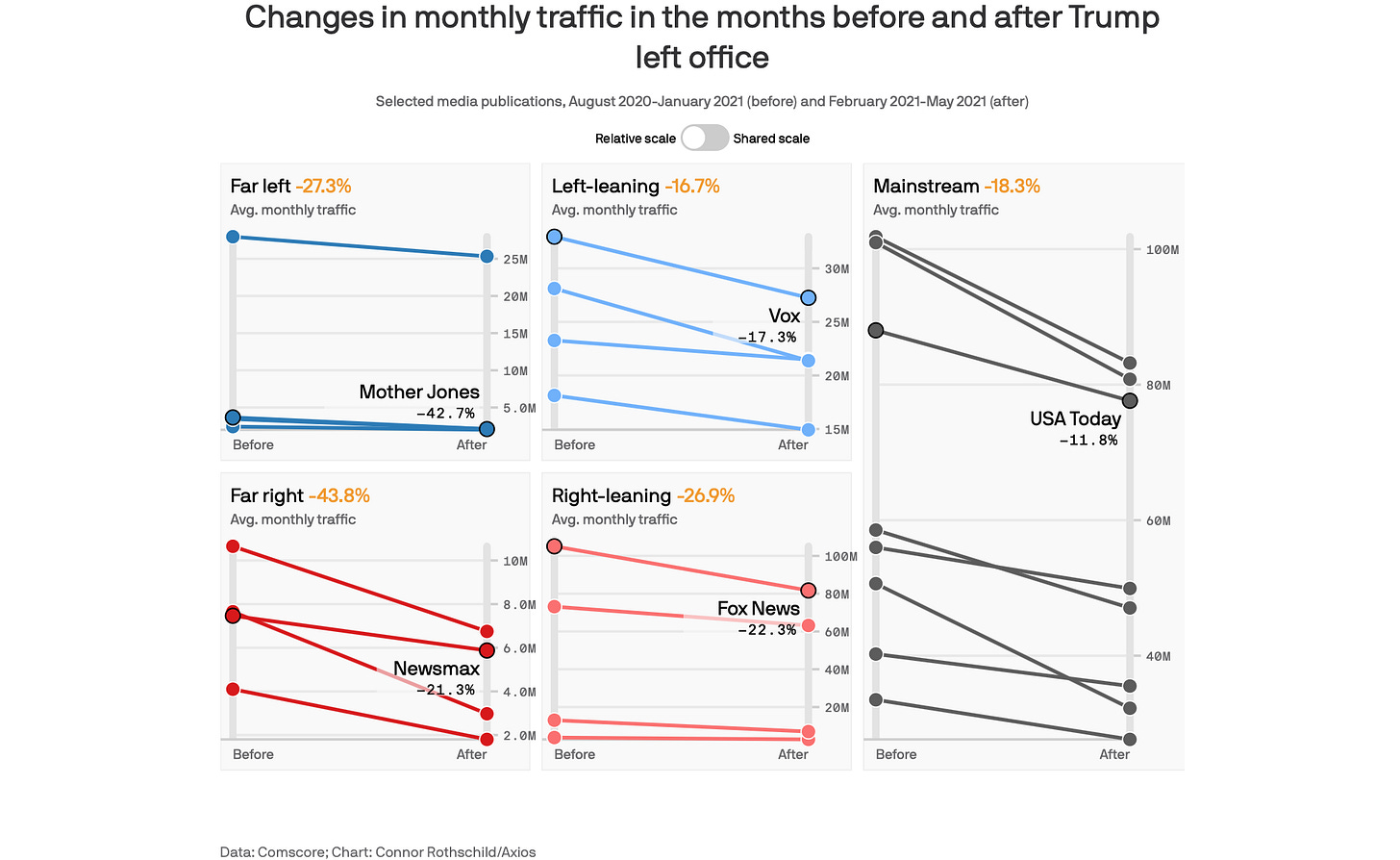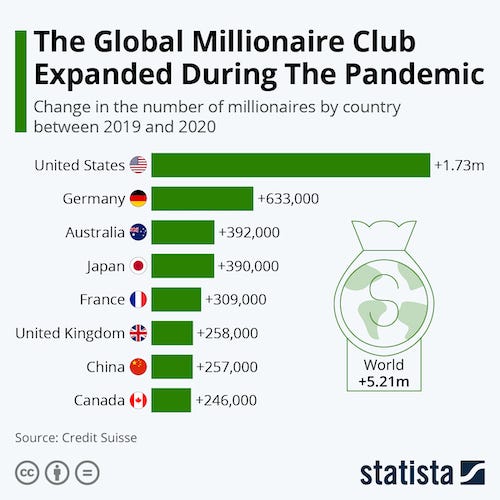Today’s posts that caught my eye:
“Truly extraordinary” is one of those phrases that, upon inspection, feels empty. I mean, if something is “extraordinary,” then it’s extraordinary; I don’t need the assurance that it’s, in fact, truly extraordinary. That said, the quote describing the U.S. home prices rise at fastest pace in more than 30 years as “truly extraordinary”… yes, that feels right. Wow.
“The New York City mayor’s race plunged into chaos when the city Board of Elections released a new tally of votes in the Democratic mayoral primary, and then removed the tabulations from its website after citing a ‘discrepancy,’” the New York Times reports. Can we all agree: The last thing we need are actual voting discrepancies.
The Axios news that since Trump left office, “publishers that rely on partisan, ideological warfare have taken an especially big hit” offers a good reminder of something Ben Thompson frequently says: If you want to know why a business does what it does, look at the business model. If you need partisan screaming to do well financially, then partisan screaming is what you’ll create.
Subscribers support the creation of the newsletter, podcasts & live events.
The World
Beijing and Moscow have stepped up their rhetoric against Washington and its allies, vowing to strengthen their quasi-alliance and promote a “more just and democratic international order” to counterbalance the United States and its ideologically driven offensive. Despite speculation about an emerging anti-US axis, a joint statement issued after a virtual summit between President Xi Jinping and his Russian counterpart Vladimir Putin on Monday denied that their countries were seeking a Cold War-style political and military coalition. Instead, they hailed bilateral ties as “mature, stable, and solid” and each other as “priority partners.” (South China Morning Post)
India has redirected at least 50,000 additional troops to its border with China in a historic shift toward an offensive military posture against the world’s second-biggest economy. (Bloomberg)
North Korean leader Kim Jong Un has warned of a “grave incident” linked to the coronavirus pandemic, stoking fears of an outbreak in the isolated country. The dictator accused senior officials of incompetence in handling North Korea’s efforts to prevent the spread of Covid-19, according to a statement by the state’s Korean Central News Agency. Officials’ neglect of important party decisions in the face of the health crisis had “caused a grave incident that poses a huge crisis to the safety of the nation and its people,” he was reported as saying. (Financial Times)
With the highly contagious Delta variant of the coronavirus continuing to spread throughout California, the Los Angeles County Department of Public Health is recommending that everyone wear masks in public indoor spaces — regardless of whether they’ve been vaccinated for COVID-19. (Los Angeles Times)
The commander of the U.S.-led mission in Afghanistan warned that the country could be on a path to chaotic civil war as American and other international troops prepare to leave in the coming weeks. (New York Times)
Large Israeli military and police forces were preparing to evict a group of about 2,000 Jewish settlers illegally squatting on a Palestinian hilltop in the West Bank last night in a test of the new coalition government’s unity and resolve. (The Times)
Five Asian countries are jeopardizing global climate ambitions by investing in 80% of the world’s planned new coal plants. Carbon Tracker, a financial thinktank, has found that China, India, Indonesia, Japan and Vietnam plan to build more than 600 coal power units. (The Guardian)
The House passed legislation to remove statues of Confederate leaders from the U.S. Capitol and replace the bust of Roger B. Taney, the U.S. chief justice who wrote the 1857 Supreme Court “Dred Scott” decision that said people of African descent are not U.S. citizens. The vote was 285 to 120, with 67 Republicans joining Democrats in backing the measure. A similar bill passed the House last year on a 305-to-113 vote but did not advance in the Senate, then controlled by Republicans. (Washington Post)
How weird is the heat in Portland, Seattle and Vancouver? Off the charts. Heat waves and the “heat domes” that can cause them aren’t rare, but the recent weather that’s been smothering the Pacific Northwest has little precedent in at least four decades of record-keeping. (New York Times)
The Northwest’s blistering heat wave underscores the fragility of our grids. (MIT Technology Review)


Nearly 70% of U.S. physicians are now employed by a hospital or a corporate entity. This is the first time the report included ownership by corporate entities outside of just hospitals. Hospitals and corporate entities, which include insurers or private equity groups, own nearly half of the physician practices in this country. (Healthcare Dive)
Medicare proposes 1.8% increase for home health agencies in 2022, while also seeking to expand the value-based care model. (Bloomberg Law)
The New York City mayor’s race plunged into chaos when the city Board of Elections released a new tally of votes in the Democratic mayoral primary, and then removed the tabulations from its website after citing a “discrepancy.” The results released earlier in the day had suggested that the race between Eric Adams and his two closest rivals had tightened significantly. But just a few hours after releasing the preliminary results, the elections board issued a cryptic tweet revealing a “discrepancy” in the report. By Tuesday evening, the tabulations had been taken down, replaced by a new advisory that the ranked-choice results would be available “starting on June 30.” (New York Times)

In the months since Trump left office, media companies’ readership numbers are plunging — and publishers that rely on partisan, ideological warfare have taken an especially big hit. Outlets most dependent on controversy to stir up resentments have struggled to find a foothold in the Biden era, according to an Axios analysis of publishers’ readership and engagement trends. (Axios)
Relatedly, the massive migration by the fringe-right to new social networks has largely died down. Almost every major conservative social network has seen a dramatic decrease in downloads since the Capitol insurrection. Parler has by far experienced the biggest drop, following removals from Amazon, Apple and Google. (Axios)
Economy
US home price growth accelerated in April at the fastest pace in more than three decades as strong housing demand continued to come up against a shortage of residential properties. The S&P Case-Shiller national home price index, which covers all nine US census divisions, rose 14.6% YoY in April. That followed a 13.3% annual jump in March, and was “the highest reading in more than 30 years,” according to the report. “April’s performance was truly extraordinary,” said Craig Lazzara, managing director and global head of index investment strategy at S&P Dow Jones Indices. (Financial Times)
Apartment sizes are getting bigger across the U.S., just as more people are looking for additional space while spending more time working from home. In 36% of U.S. cities, apartments under construction are larger on average than those built over the previous five years, according to a report from RENTCafé, a nationwide apartment-search website. Units in 33 of the 92 cities studied rose nearly 50 square feet on average. (Wall Street Journal)
‘Great Resignation’ gains steam as return-to-work plans take effect. A whopping 95% of workers are now considering changing jobs, and 92% are even willing to switch industries to find the right position, according to a recent report by jobs site Monster(dot)com. Most say burnout and lack of growth opportunities are what is driving the shift, Monster found. (CNBC)
Southwest Airlines is increasing overtime pay, including offering double-time pay for flight attendants, in an effort to head off potential staffing crunches during the Fourth of July travel weekend. Southwest’s operation has been snarled by technical snafus and a run of bad weather in recent weeks. The airline canceled hundreds of flights over the weekend and Monday as severe thunderstorms hit some of its busiest airports. (Wall Street Journal)
Chinese ride-hailing goliath Didi Global Inc. priced its IPO at $14 on Tuesday afternoon, setting the stage for the company to begin trading Wednesday, after it made a lightning-fast pitch to potential investors. Given the upsizing, the pricing would give Didi a market capitalization of more than $67 billion, which would trail U.S. ride-hailing firm Uber Technologies Inc.’s roughly $95 billion but land well ahead of Lyft Inc., which sits at roughly $20 billion. (Wall Street Journal)
After a brief dip, gasoline prices in the U.S. are on the rise again. The U.S. average price for a gallon of gasoline rose 2 ½ cents from last week to $3.09 per gallon Monday, according to the travel and fuel price tracking app GasBuddy. (Los Angeles Times)
Technology
Senior members of Congress renewed calls to overhaul U.S. competition law following the failure of two landmark attempts to break up Facebook. Democrats and Republicans criticized the federal court decision to dismiss one complaint against the social media company by the FTC and another by individual states. Several said the judgment illustrated the need to rewrite antitrust rules, with six major bills designed to rein in the power of Big Tech being debated on Capitol Hill. (Financial Times)
Google must turn over to the Justice Department the performance reviews for its current and former employees who will be deposed in the antitrust cases against the search giant brought by state and federal regulators, a federal judge said Tuesday. The DOJ said the employee self-assessments in the reviews offer candid remarks about Google’s goals for market share and exclusive contracts. (The Information)
Microsoft plans to increase its legal and corporate affairs unit by 20% in the coming fiscal year as it prepares for what it sees as a years-long wave of tech regulation across the globe, Microsoft president Brad Smith said. (Axios)
Chip maker Intel is delaying production of one of its newest chips to improve performance, the first significant product setback under new Chief Executive Pat Gelsinger as he seeks to rebuild the company’s competitiveness. Intel now is planning to start producing the next generation of central processing units for servers—the brains of those machines—in early 2022 after previously saying it would be ready late this year. (Wall Street Journal)
Education-technology company 2U Inc., which runs graduate programs for dozens of top universities, is buying web-based course provider edX, a nonprofit founded by Harvard University and the Massachusetts Institute of Technology, for $800 million.
The deal combines two major players in online instruction as universities around the world push more aggressively into digital offerings. Many schools scrambled to shift courses online when the pandemic shut campuses last year, and they are now expected to build on—and polish—the programs. (Wall Street Journal)
Facebook is getting into the subscription newsletter game. It’s launching a new service, called Bulletin, that allows writers to publish free and paid newsletters that can be posted to the web, sent to subscribers’ inboxes, and shared across Facebook. Perhaps the biggest perk for now: Facebook says it won’t take a fee from writers “at launch,” and writers retain full ownership of their work and subscriber list. (The Verge)
Apple’s spending on Google Cloud storage is on track to soar 50% this year. (The Information)
Smart Links
700 million LinkedIn records for sale on hacker forum, June 22nd 2021. (Privacy Sharks)
Business travelers from big multinationals get English quarantine waiver. (Financial Times)
United Airlines bets on post-pandemic growth with its biggest-ever jet order. (Wall Street Journal)
Bill and Melinda Gates are focusing on separate investing goals amid divorce drama. (Fortune)
Venus doesn’t have enough water in its clouds to sustain life. (MIT Technology Review)
An opioid case like no other: NY vs. the supply chain. (New York Times)
‘Today’ podcast will open NBC’s morning show to round-the-clock audio. (Variety)
North America recaptures the top spot in total millionaire population. (Barron’s)
The global millionaire club expanded during the pandemic. (Statista)
Good News
Two co-workers chatted. They soon realized they were each a match for the other’s husband, who needed a kidney. (Washington Post)


Wimbledon only just began, and it appears we already have a winner: A standing ovation for healthcare staff and Prof Dame Sarah Gilbert (creator of the Oxford-AZ vaccine) on Centre Court. (h/t MIT Tech Review’s The Download)


Subscribers support the creation of the newsletter, podcasts & live events.




